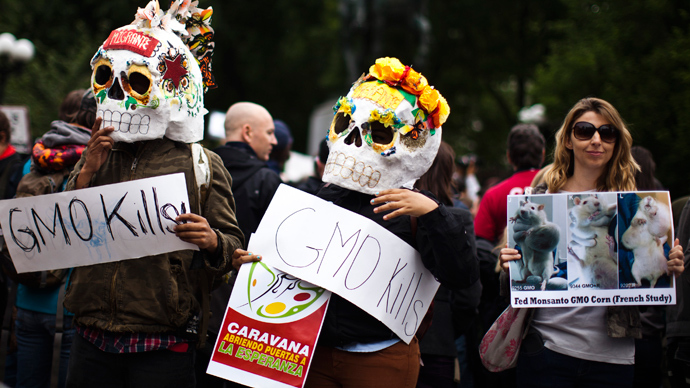Three activists taking part in an anti-Monsanto protest were arrested by Capitol Police after dumping bags of money on the floor of the atrium to the Senate’s Heart building.
The protesters, who were playing the part of biotechnology industry lobbyists “thanking” politicians for their support as part of the fictitious “Biotechnology Industry Awards Committee” or BIAC, dumped briefcases of real cash.
"The USCP arrested three demonstrators in the atrium of the Hart Senate Office Building," Lieutenant Kimberly Schneider told the Washington Examiner newspaper.
Videos posted on YouTube showed one of the activists on the floor of the atrium, showering herself with the paper bills while another threw them into the air around her.

According to a release put out by the groups behind Thursday’s protest, the Organic Consumers Association and Occupy Monsanto, the real lobbyists were expected “to lunge for the fluttering bills...creating a melee” to shut down the entrance to the building.
The protest was aimed at what organizers allege are back room deals going ahead during the government shutdown, specifically the amendment to the House Farm Bill presented by Rep. Steve King (R-Iowa). The activists were to dole out “Monsanto’s Minions Awards” to members of Congress the groups say have been particularly accommodating to biotech companies.
“The legislative pressure-cooker created by self-inflicted deadlines and crises like the fiscal cliff, the shutdown and the debt limit are the worst way to write legislation. Corporate lobbyists are here to take advantage of the situation. That’s how we got the Monsanto Protection Act in March. We’re here to try to stop that kind of thing from happening again,” wrote Alexis Baden-Mayer, political director of the Organic Consumers Association, who took part in Thursday’s protest as “Jennetta Kontamy-Nashun,” a member of the BIAC.
Activists allege that King’s amendment would circumvent oversight through the normal conference committee process, as was the case when Sen. Roy Blunt (R-Mo) attached a rider to a continuing resolution to fund government derided by opponents as the “Monsanto Protection Act.” That piece of legislation was aimed at pausing judiciary oversight over the planting of new genetically engineered crops.
Shouting "Monsanto money!" activists protest #Monsanto and GMOs at Hart Senate Office Building pic.twitter.com/sTL06l2vRV
— Jared Gilmour (@jaredgilmour) October 10, 2013
Rep. King’s amendment, the Protect Interstate Commerce Act, is a provision aimed at preventing standards or conditions from being imposed by one state onto another’s agricultural products.
Advocates believe that the amendment is written so broadly that it could therefore nullify a number of state and local laws that involve everything from GMO food labeling, which biotech companies have spent millions to oppose, as well as pesticide and antibiotic use and animal welfare rules.
Rep. King has insisted that the language of the amendment is designed to invalidate California’s Proposition 2, which requires large cases for egg-laying hens, allowing the animals to stand and spread their wings.
The Farm Bill officially expired on October 1, the first day of the ongoing government shutdown, and has yet to make its way out of Congress in its final form.
Thursday’s protest according to the group was modeled after another similar action that took place decades ago at the New York Stock Exchange. On August 24th, 1967, about a dozen members of the counter-culture Youth International Party, or Yippies, threw handfuls of dollar bills onto the trading floor.
According to witnesses at the time, some of the traders at the floor during the stunt took it in stride and waved back, though others jeered and shook their fists at the group.
Several months after the Yippie incident at the NYSE bulletproof glass and metal grills were installed around the visitors’ gallery.

